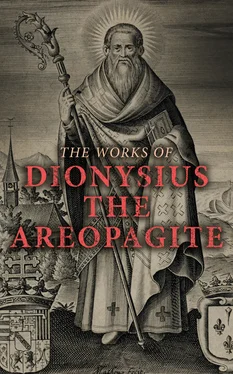SECTION V.
But we have spoken of these things in our Symbolical Theology. Let us now then celebrate the spiritual Name of Light, under Which we contemplate the Good, and declare that He, the Good, is called spiritual 33Light, on the ground that He fills every supercelestial mind with spiritual light, and expels all ignorance and error from all souls in which they may be, and imparts to them all sacred light, and cleanses their mental vision from the mist which envelops them, from ignorance, and stirs up and unfolds those enclosed by the great weight of darkness, and imparts, at first, a measured radiance; then, whilst they taste, as it were, the light, and desire it more, more fully gives Itself, and more abundantly enlightens them, because “they have loved much,” and ever elevates them to things in advance, as befits the analogy of each for aspiration.
SECTION VI.
The Good then above every light is called spiritual Light, as fontal ray, and stream of light welling over, shining upon every mind, above, around 34, and in the world, from its fulness, and renewing their whole mental powers, and embracing them all by its over-shadowing; and being above all by its exaltation; and in one word, by embracing and having previously and pre-eminently the whole sovereignty of the light-dispensing faculty, as being source of light and above all light, and by comprehending in itself all things intellectual, and all things rational, and making them one altogether. For as ignorance puts asunder those who have gone astray, so the presence of the spiritual light is collective and unifying of those being enlightened, both perfecting and further turning them towards the true Being, by turning them from the many notions and collecting the various views, or, to speak more correctly, fancies, into one true, pure and uniform knowledge, and by filling them with light, one and unifying.
SECTION VII.
This Good is celebrated by the sacred theologians, both as beautiful and as Beauty, and as Love, and as Beloved; and all the other Divine Names which beseem the beautifying and highly-favoured comeliness. But the beautiful and Beauty are not to be divided, as regards the Cause which has embraced the whole in one. For, with regard to all created things, by dividing them into participations and participants, we call beautiful that which participates in Beauty; but beauty, the participation of the beautifying Cause of all the beautiful things. But, the superessential Beautiful is called Beauty, on account of the beauty communicated from Itself to all beautiful things, in a manner appropriate to each, and as Cause of the good harmony and brightness of all things which flashes like light to all the beautifying distributions of its fontal ray, and as calling (καλοῦν) all things to Itself (whence also it is called Beauty) (κάλλος), and as collecting all in all to Itself. (And it is called) Beautiful, as (being) at once beautiful and super-beautiful, and always being under the same conditions and in the same manner beautiful, and neither coming into being nor perishing, neither waxing nor waning; neither in this beautiful, nor in that ugly, nor at one time beautiful, and at another not; nor in relation to one thing beautiful, and in relation to another ugly, nor here, and not there, as being beautiful to some, and not beautiful to others; but as Itself, in Itself, with Itself, uniform, always being beautiful, and as having beforehand in Itself pre-eminently the fontal beauty of everything beautiful. For, by the simplex and supernatural nature of all beautiful things, all beauty, and everything beautiful, pre-existed uniquely as to Cause. From this Beautiful (comes) being to all existing things,—that each is beautiful in its own proper order; and by reason of the Beautiful are the adaptations of all things, and friendships, and inter-communions, and by the Beautiful all things are made one, and the Beautiful is origin of all things, as a creating Cause, both by moving the whole and holding it together by the love of its own peculiar Beauty; and end of all things, and beloved, as final Cause (for all things exist for the sake of the Beautiful) and exemplary (Cause), because all things are determined according to It. Wherefore, also, the Beautiful is identical with the Good, because all things aspire to the Beautiful and Good, on every account, and there is no existing thing which does not participate in the Beautiful and the Good. Yea, reason will dare to say even this, that even the non-existing participates in the Beautiful and Good. For then even it is beautiful and good, when in God it is celebrated superessentially to the exclusion of all. This, the one Good and Beautiful, is uniquely Cause of all the many things beautiful and good. From this are all the substantial beginnings of things existing, the unions, the distinctions, the identities, the diversities, the similarities, the dissimilarities, the communions of the contraries, the commingling of things unified, the providences of the superior, the mutual cohesions of those of the same rank; the attentions of the more needy, the protecting and immoveable abidings and stabilities of their whole selves and, on the other hand, the communions of all things among all, in a manner peculiar to each, and adaptations and unmingled friendships and harmonies of the whole, the blendings in the whole, and the undissolved connections of existing things, the never-failing successions of the generations, all rests and movements, of the minds, of the souls, of the bodies. For, that which is established above every rest, and every movement, and moves each thing in the law of its own being to its proper movement, is a rest and movement to all.
SECTION VIII.
Now, the divine minds 35are said to be moved circularly indeed, by being united to the illuminations of the Beautiful and Good, without beginning and without end; but in a direct line, whenever they advance to the succour of a subordinate, by accomplishing all things directly; but spirally, because even in providing for the more indigent, they remain fixedly, in identity, around the good and beautiful Cause of their identity, ceaselessly dancing around.
SECTION IX.
Further, there is a movement of soul, circular indeed,—the entrance into itself from things without, and the unified convolution of its intellectual powers, bequeathing to it inerrancy, as it were, in a sort of circle, and turning and collecting itself, from the many things without, first to itself, then, as having become single, uniting with the uniquely unified powers, and thus conducting to the Beautiful and Good, which is above all things being, and One and the Same, and without beginning and without end. But a soul is moved spirally, in so far as it is illuminated, as to the divine kinds of knowledge, in a manner proper to itself, not intuitively and at once, but logically and discursively; and, as it were, by mingled and relative operations; but in a straight line, when, not entering into itself, and being moved by unique intuition (for this, as I said, is the circular), but advancing to things around itself, and from things without, it is, as it were, conducted from certain symbols, varied and multiplied, to the simple and unified contemplations.
SECTION X.
Of these three motions then in everything perceptible here below, and much more of the abidings and repose and fixity of each, the Beautiful and Good, which is above all repose and movement, is Cause and Bond and End; by reason of which, and from which, and in which, and towards which, and for sake of which, is every repose and movement. For, both from It and through It is both Essence and every life, and both of mind and soul and every nature, the minutiae, the equalities, the magnitudes, all the standards and the analogies of beings, and harmonies and compositions; the entireties, the parts, every one thing, and multitude, the connections of parts, the unions of every multitude, the perfections of the entireties, the quality, the weight, the size, the infinitude, the compounds, the distinctions, every infinitude, every term, all the bounds, the orders, the pre-eminences, the elements, the forms, every essence, every power, every energy, every condition, every sensible perception, every reason, every conception, every contact, every science, every union, and in one word, all things existing are from the Beautiful and Good, and in the Beautiful and Good, and turn themselves to the Beautiful and Good.
Читать дальше












